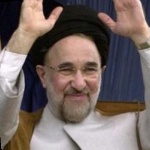Changes needed to avoid further harm to Iran's image, Khatami says
 Tehran - Former Iranian president Mohammad Khatami said Wednesday that political changes were needed to avoid further harm to Iran's international image, the ISNA news agency reported.
Tehran - Former Iranian president Mohammad Khatami said Wednesday that political changes were needed to avoid further harm to Iran's international image, the ISNA news agency reported.
"The political status quo is not suitable and should be changed and amended; otherwise, Iran's international image would further be harmed and tarnished," said Khatami in his first remarks since his official nomination Sunday to run against President Mahmoud Ahmadinejad in the June 12 presidential election.
Ahmadinejad has not only failed to deliver promised economic reforms but also has persisted in the country's controversial nuclear programme, leading to the imposition of financial sanctions by the United Nations, Khatami charged.
His opponent's tirades against Israel have also pushed Iran into international isolation, the former president said.
"It is our [reformists'] duty in the current situation to enter the scene," he added in a meeting with reform groups.
The 65-year-old had withdrawn from active politics after his 1997-2005 presidential tenure, but he has on occasion criticized Ahmadinejad, including the leader's tirades against Israel and denial of the Holocaust.
Reformist and moderate circles in Iran are currently trying to promote Khatami as their sole candidate and turn the presidential race into a duel between Khatami and Ahmadinejad.
The reformist wing, however, currently has two candidates. Besides Khatami, former parliament speaker Mehdi Karroubi has announced his candidacy although he is widely considered as less charismatic than Khatami and, therefore, having less of a chance to successfully take on Ahmadinejad.
If Karroubi does not withdraw, the votes for the reformists would be split, increasing the likelihood of an Ahmadinejad victory, reformists said they fear.
"We can have different viewpoints but still work together," Khatami said, indicating his willingness to cooperate with Karroubi.
Both Khatami and Karroubi want reforms within the current Islamic system, but other reformist circles go beyond those aims and seek a rather secular course.
The influential conservative clergy in Iran as well as the Revolutionary Guards, however, consider any secular trend as a threat to the Islamic system and have confronted the reformist wing by closing down newspapers and arresting dissidents.
"We [the reformists] are part of the system and acknowledge the constitution and should, therefore, not be considered as opposition," Khatami said.
According to the constitution, the Islamic system is based on the leadership of a jurist, currently the Ayatollah Ali Khamenei, who has the final say on all state affairs.
Anybody opposing the constitutional role of the supreme leader is not allowed to run in presidential or parliamentary elections.
"We believe both in the revolution and democracy compatible with religion," said Khatami, whose ultimate vision is to implement an Islamic democracy in Iran.
According to analysts, a high voter turnout in June would increase the chances of Khatami, but a low turnout would likely help Ahmadinejad to a second term. (dpa)